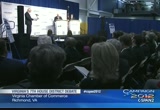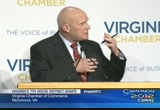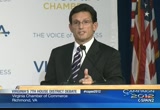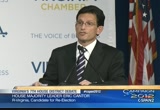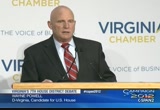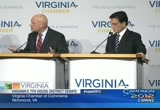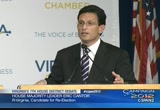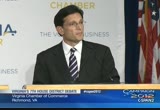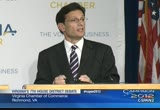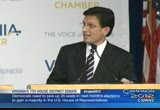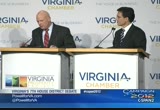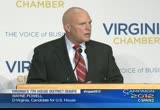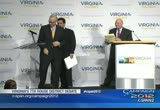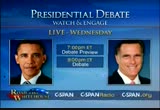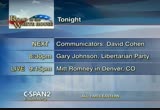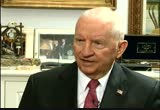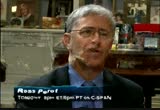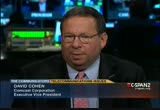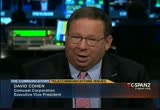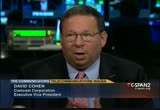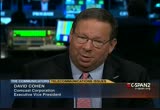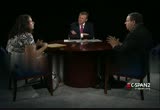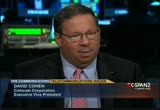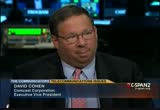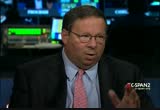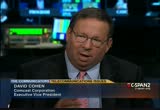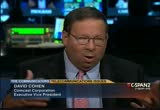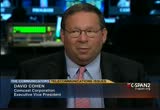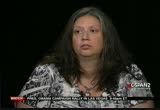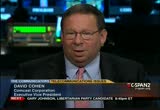tv The Communicators CSPAN October 1, 2012 8:00pm-8:30pm EDT
8:00 pm
>> moderator: mr. powell. powell: i have a minute, right? >> moderator: one minute yes. powell: the biggest danger to national security is you continuing to the majority leader in the congress. your obstruction and dysfunction was named by s&p and even bob gates. he said that congregation that dysfunction was a national security issue. you talk about it. look in the mirror. you caused it. let me also say that the sequester is not the issue here. the issue is the blame game. the issue is you telling this audience and everybody else that it's not the congress -- you're right. i never have been in congress. i will be soon. they did this and and that. president obama did this and that. the constitution says that the congress establishes "the budget" for you to stand here and say you did not vote for the sequester when you voted for the
8:01 pm
sequester. this is not magical thinks. it's reality. i'm not attacking. i'm describing. you it's a difficult process. but i'm trying. you supported it and now you don't. and there's a good reason you don't. you need to sit down and talk. >> moderator: okay. powell: thank you. >> moderator: one final question before we get to the con clued remarking. that is one issue that's been on the radar screen in the virginia business community for twenty years for the transportation infrastructure in virginia. that have been bless number of magazines for ten or fifteen or twenty years now. one of the issues that has arisen recently however is that we were sort of knicked down a little bit because they said we weren't doing enough for the transportation infrastructure. . .
8:02 pm
>> whether it has to do with the participation of public/private partnerships, whether it has to do with the ability to do bonding, there are many restrictions that the federal government, that washington seems to think is, um, you know, a good idea and ends up being counterproductive with a state like virginia that is growing, that has all the potential in the world but yet being held back because of its infrastructure shortcomings. so, yes, there's a lot we can do
8:03 pm
which is less and allow virginia to do more. >> moderator: mr. powell. powell: u.n., eric, you did not -- you know, eric, you did not support the stimulus the president initiated, however -- and, of course, i read so many things, i can't remember where i read it. i believe fredericksburg up to norb -- northern virginia. i may be wrong about that. >> you're wrong about that. >> well, let me finish. i let you finish, let me finish. in any case, you don't like government. you should just, like, resign, and i'll take over. [laughter] needless to say, government does have a role. i met people all over the district who, for example, in orange and culpepper counties, real people, human beings who couldn't get a connectivity for their cell phones, couldn't get their computer to work, couldn't call anybody.
8:04 pm
people who couldn't get easily to d.c. because of the infrastructure, the roads, the bridges. these are things that a good many democrat and republican presidents have given by block grants to create roads. dwight eisenhower, the interstate system, back when the marginal rate was 94% in this country, oh, yeah, and he was republican. >> you want that? >> we only get one question. no. i just want you to pay more because you earn a lot more. but what we need to do, the government does have a macro view, a macro duty, i think, to talk to the states, see what the states need and if they have enough tax revenue which, of course, they don't have now because we have the lowest tax revenue since 1950, or at least it's been a long, long time, and there are things that the federal government can work with the states. give the states the power to use the money the way they want to. i agree to a certain degree the federal government needs to get
8:05 pm
out of the way, but as far as providing block grants, that what the federal government should do. >> congressman cantor. cantor: again, i would just say that, wayne, you just mischaracterized my statements once again. i said i am for block grants. i think that the state ought to have control. i'm not saying that washington shouldn't give the states the money. yes, states should have the money from washington, okay? transportation is a governmental function. and, yes, we all believe that i think in the jeffersonian tradition of a limited government. and that's what we're trying to get to. and so, you know, you mentioned the lowest tax revenue and you didn't say since when, but i will tell you there's a reason for that. the reason is because we have a lackluster economy. there's not enough economic activity. the whole discussion that we've had tonight comes back to that; how are we going to create more economic activity? we do so by making america more competitive, by lowering taxes,
8:06 pm
by getting a much more sensible regulatory environment and, yes, repealing obamacare. these are the burdens that we've got to remove. >> moderator: now time for our closing statements, and by the order of the coin toss, congressman cantor goes first. cantor: you know, i think what you've seen tonight is certainly a robust discussion, and, um, a debate though, frankly, that has been peppered, unfortunately, with what is wrong with politics today. and that is just a rash of personal attacks, indirect attacks on my family, and as we saw repetitive disregard for honesty and truth. and the thing is, none of these negative attacks do anything to create a job, do anything to educate a child or do anything to bring down the deficit. but attempts at attacks and character assassination the way that mr. powell's been about tonight, frankly, make it a lot harder to solve problems, to
8:07 pm
compromise, to sit down and actually get something done. but i think that, mr. powell, you underestimate the decency of the voters of the seventh district, and i've had the privilege of representing this district for almost 12 years. and i can tell you we're honest and hard working people, and i have every confidence that the voters are going to reject your negative campaign. but i want to end this debate where we began. this election is about the future and about what kind of country we want to be. now, there's one path that i've advocated, lower taxes, less regulation that will produce more jobs. mr. powell's view is we need to raise taxes, we need government coming in and imposing regulation on businesses. but the fact is, we all know that the unprecedented prosperity of america did not come because the government just spent more money. it came because individuals, entrepreneurs came to this country, they committed their own time, talents and hard work and money, and they built, they
8:08 pm
built their businesses. and that's what we've got to focus on. and so in closing, i just want to reference a small business owner down the street here in gooseland, a restaurant owner, doug elliot. many of us go to enzo's, that's his restaurant. and the thing is he, just like the waitress who works for him, the cook that's in his kitchen, one thing they all want together is more customers walking into the door because more diners mean more business, more tips and wages for the waitress and cook, and it means more compensation profits for doug so he can hire more people, increase wages and grow his business. that's what he's all about. that's what this election's about. this election is about who is best fit to lead, to create an environment that we can see more economic activity, more business growth and more jobs. that's what this is about. and i think it's very clear the two visions and the choice that the voters will have in november. again, i want to thank you, bob, and i want to thank the chamber
8:09 pm
for hosting us tonight. it's been an enjoyable discussion. [applause] >> moderator: mr. powell. powell: well, once again i didn't have a lot of time at the beginning, but i want to thank everybody for being here, the press especially. this is the first time, as i understand it, that in ten years mr. cantor has debated, and thank you, chamber, for sponsoring this. you heard a lot of washington speak tonight because he's had 12 years to practice it. you haven't heard much about what happened prior to the normal chorus of low taxes, too much regulation. that's all mr. cantor talks about. that's all he ever talks about. he doesn't talk about voting for unfunded war, voting for unfunded medicare part d because
8:10 pm
that's much too painful. the people he talks about that are struggling to get their jobs, the people i've talked about, talked to in the last year and a half plus, the people that are struggling to make it are the people who lost their jobs because of the wild speculation wch your deregulation that you supported caused. and the people swimming in their mortgages, all those things, all the things that people have suffered for after glass-steagall was rescinded in 1999, and the eight million jobs that were lost. these are all things we haven't mentioned tonight, but these are the things that our country now suffers from. you hear lower taxes. we're in a war right now, people. and i think everybody here knows that. how irresponsible is it to say lower regulation, lower taxes, we'll get more jobs, oh, and we have those people over in afghanistan. so i think if you can overcome the washington speak and find
8:11 pm
that my comments and my righteous indignation is worthy of your vote, then i want your support because 12 years is long enough. and if you can't think of what mr. cantor's legislative accomplishments were over the last 12 years, then you're not alone. thank you all and have a good evening. [applause] >> moderator: thank you, and -- we'd like to again thank the virginia chamber for hosting this event. please also thank carmax for being such a great host and sponsor. powell: i forgot to thank carmax, thank you. >> moderator: and let's have a round of applause for our two candidates. thank you very much. [applause]
8:12 pm
>> when nations cheat in trade d cin h chted, iwill finally do something the tm then w e] w brought mre treses nst chinain oth teat d t theveenwios ce >>edidama nehe thtrentia. newouehr l deratefr the univerty of nver. tch gage with c-span with our live debate previe 7 p.m. eastern followed two ways to watch the debate at 9. c-span, candidates on screen the entire debate, and on c-sp the multicamera version of the debate. and following your reactions, calls, e-mails and tweets. follow our live coverage on c-span, c-span radio and online at c-span.org. tch and enga.cpa cspanet-span.g.
8:13 pm
comg tig on c-span2, "communicators" features david cohen, comcast executive vicerede. enti candidate grri acng ah co f a campaignhe rally with republican presidential candidate mitt romney. on "washington journal" tomorrow morning, we'll examine the health care law that presidential candidate mitt romney signed into law when he was governor of massachusetts. our guest is boston herald reporter christine mcconnell. we'll be joined by howard kertz and lauren ashburn of the daily download to look at the use of social media in the presidential campaign. and we'll discuss the college board's recent report on how high school students are doing
8:14 pm
on the s.a.t.s. our guest is college board vice president james montoya. washington journal journal is live on c-span every day at 7 a.m. eastern. tuesday the new america foundation looks at the role of money in the 2012 elections. panelists include former sec chairman trevor potter. live coverage starting at 12:15 p.m. eastern on c-span. >> every generation through our history has worked and sacrificed to leave a better country to their children, their grandchildren and future generations. we're spending their money, we are now even more, much more spending their money, and we are leaving them a mess that will be a very difficult to deal with, and if we are tt weak, just think of who wants to come here first and take us over. now, the last thing i ever want
8:15 pm
ken er bcae 're sooy finciallwe we can't do anything. >> uh-huh. >> and we'reove anytha direction. we're on t edge theliff, and we have goto start fixing it now, otheisee're leaving a disaster to our children and granhiren in the future, and we could even los ourcouny. ross perot, interviewed by "usa today"'s richard wolffe on the economy, the deficit a debt and how it's changed since he ran r presidenn 1992 and '96. fi richard wolffe's article in today's edition of "usaoday" and at usa today.co ross per tonight on c-span at 9 eastern. >> host: and joining us thi week on "the counicators" is david cohen, comcast's executive vice president. mr. cohen, the last timyou were on this program was april 2009, just a few months before -- >> guest: sounds like an eternity. [laughter] >> host: just a few months beforeomca c bought a lot of
8:16 pm
nbc. do you feel fully integrated? >> guest: well, i don't know that we're fully integrated, but i think we, um, feel very comfortable with the asset and feel very comfortable with the level of integration between the two companies. they're, obviously, very different businesses, very different companies, and steve burke had a great vision going in that he wanted to bring the best parts of the comcast culture and the comcast management culture but respect the differences between the companies and the unique, um, you know, some of the unique approaches and cultures of nbc universal as being an entertainment and a content and a news and information company as opposed to a distribute company. and i think, i think steve's been able to execute that balance, um, almost perfectly. in many bringing the parts of the company together that need to be brought together but in respecting the differences between the companies and allowing the two companies sometimes to function in
8:17 pm
accordance with their historic practice and culture. >> host: you own, what, 51% of nbcu? >> guest: we own 51% now with a pathway, obviously, to ultimately owning all of it, and we are the manager of the enterprise. >> host: do you see moving forward owning it all? >> guest: well, what we've said is that we, you know, we have the optionality, ge's optionality and our optionality, it's stated -- at stated time three-and-a-half years after close, three-and-a-half years after close. but we're certainly very happy with the asset, we're happy with the company, we're happy with the combination of content and distribution, um, and we think maybe more importantly than our happiness, we think that customers of both companies are very happy. >> host: david cohen, what are you doing in washington? >> guest: well, of course, i'm always in washington, but on this particular trip we're here to celebrate the year two launch of internet essentials, what
8:18 pm
we're calling internet essentials 2.0. we, obviously, had an incredibly successful first year. internet essentials being the nation's largest and most comprehensive broadband adoption program for low income americans. in our first year we were able to sign up over 100,000 families, that's over 400,000 low income americans, most of them for the first time this their lives being connected to the internet in their homes. and, you know, i think that sounds like a big number, i hope it does, but to size it for you, um, that is e give elect to the entire -- equivalent to the entire population of major cities in america, cities like miami, florida; tulsa, oklahoma; minneapolis/st. paul. their populations are all around 400,000 people. so i think when you are successful in signing up the equivalent of a major city in america for this service, you have something that is gaining traction and making sense. >> host: now, is this something that was mandated as part of the
8:19 pm
nbc deal, or is this something that comcast is doing on its own? is. >> guest: so the answer is both. this was a comcast concept that we, that we were preparing before the nbc universal transaction. we offered it up as a voluntary commitment to the fcc as something to help the fcc in its public interest determination, but we would have done this with or without the nbc universal transaction. and we've, obviously, gone far beyond the nature of the commitment in terms of the, in terms of eligibility of the program and the speed of the project, of the product, the way we're running sign-ups, the way we're promoting it. so we are, we are certainly in internet essentials 2.0, it barely resembles the origin program that we put in front of the commission as a voluntary commitment. >> host: before we go any further, we want to introduce amy maclean,editor-in-ief of
8:20 pm
blefax daily. >> hi. i stand toollow up a ttle bit on internet essentials. i know some of the eay data you had from that program was that the comuter take rates were really low for the discounted offerings. have you got any more details as to why that is, or -- >> guest: first of all, take ras are little higher as we've tten through the year, over 100,000 families, 11,500 computers being sold. so that, you know, the first 0,000 we only -- 40,000 we only had a couple thousand computers being sold, so the take rate has picked up. based on our research, i mean, we thought computers were going to be an essential element of this because the research, the general research out there is that one of the significant impediments to low income americans signing up for internet service is that they don't own a compute beer. the research we did of internet essentials customers is that, is that, um, most of the internet essentials customers said that they already owned a computer.
8:21 pm
and if you think about it, that might make sense in the early days of our program because we all know that the major barrier to broadband adoption particularly in low income neighborhoods is a whole bucket of digital literacy skills and issues. people don't understand the internet, they don't know the value of the internet, don't know how to use the internet, don't know how to use a computer, they're afraid of the internet. and it would make sense that early adopters might be families who already had a computer, who might have past experience with the internet, and so we may be in the early days of the program, we may just be hitting a population where the computer hardware is not necessarily the major impediment for those families. but we're, we're obviously concerned about it. we keep looking at it. we're worried about the price point, although there doesn't seem to be any evidence that the less than $150 price point has been a problem.
8:22 pm
we are worried because in the internet essentials 1.0 the hardware option was for a netbook computer, and for some people that's a great choice, but other people might prefer a desktop or a laptop to a netbook, more flexible use. and so we were very happy yesterday to announce, um, a partnership with connect to compete which is the, um, nonprofit that chairman general genachowski announced last year in partnership with the capable industry including comcast. and so we have a partnership with them where internet essentials customers are going to have access to the redemtech computers that are going to be offered as part of connect to compete. those are going to be laptops and desktops. so now if you're an internet essentials customer and you want to buy a computer for the same $149.95 cost, you can get a netbook, a laptop, or you will be able to get a netbook, a laptop or a desktop computer.
8:23 pm
so we hope by increasing the optionality here, um, and increasing the choices that customers have, um, that we'll be able to accommodate any demand that our customers have for the hardware. >> host: are you finding that most of these customers would prefer mobile? >> guest: so that's a very interesting question. um, obviously, all of the customers who we've signed up want to have a wire line connection, because that's what we're selling. and, but there's a lot of research out there that, um, that, in fact, mobile usage, um, is even higher among minority communities than it is among white communities. um, i've seen some pretty startling research, um, that in some of these minority communities 70 or 80% of the usage of the broadband is through mobile applications. now, i -- i'm not a critic of mobile, of mobile broadband in any way whatsoever. um, you know, after the verizon
8:24 pm
wireless transaction, we're in the business. so no reason for me to be critical. so my comment now is not a platform comment, it's more a device comment than it is a platform comment, and that is, um, if you're going to do mobile on a laptop and you're going to get real broadband speed, so lte-type speeds, i don't have any problem whatsoever. but if you go into the educational context and you're talking about mobile on a smartphone and a lot of this access to, um, the broadband through mobile devices in minority commitments in particular is via smartphones, i don't view that as an acceptable substitute for, um, netbook, laptop or desktop. and i met a woman in atlanta, um, who had a son in middle school who was in an advanced writing program, and one of the, um, writing assignments was, um, to edit a newspaper story. and the way you did it is the school had a homework site, and
8:25 pm
you went on the site, you downloaded, um, the the newspaper article, you edited it, and you then uploaded the edited article to the site where the teacher would have access to it, could mark it up, correct it and put it back on the site for you and your parents to see. and this was, this was a family that did not have broadband in their home, and the woman told me he was signing up for it because of internet essentials. and when i asked her, you know, well, what do your kids do now for homework, she told me the story about this assignment. i said, well, how did your son do the assignment? well, he did it on my smartphone. and i looked at her, and she had tears in her eyes. she said, mr. cohen, have you ever tried to edit a document on a smartphone? i said, well, you're talking to the wrong person, i actually edit documents on my blackberry -- [laughter] but i agree, it takes twice as long, it's very hard. amy, you're a professional writer, i don't -- i mean, for
8:26 pm
me in editing i still like to see a page, i like to see the context of it, not just a sentence or two on a smartphone. um, and this woman got it, that smartphone access to the internet to, for purposes of homework doesn't work. um, it's not what the, it's not what the tremendous educational enhancements that are available via the internet are supposed to wok on. work on. they're designed to work on large screens and, you know, large screens means primarily wired connections. the other problem with mobile, with mobile connections is the expense. i mean, um, you'll go through $9.95 worth of data with one night's homework assignment. so, obviously, by offering this product at $9.95 all you can eat for, you know, for the month is a tremendously attractive
8:27 pm
option, um, for families. and i think more attractive than any mobile product that's out there. >> host: i'm mcclain. >> are you looking to expand your adoption efforts to other demographics like seniors? >> guest: always under consideration. i'm a big believer in learning to walk before you run. i think, again, all the research out there says that the most important and value-added population to aim for is the population of low income families with children because you get the, you get the benefit not only of the parents, but of the kids. kids are in school, you're getting the educational impact of that. but we have looked at, you know, senior population, veteran population, disabled population. the problem with all those populations is they're much more complicated to reach, eligibility determinations are more complex. the beauty of internet essentials is that eligibility is simple and chris call clear. if -- crystal clear.
8:28 pm
if you have a child living in your house as long as he's eligible to participate in the free or reduced school lunch program, you're eligible. and everybody know's that. if you were to take and say, well, if you're a senior citizen -- which we define as being over 65, let's just say -- everyone knows whether they're over 65, but then we have to say and you're at 150% or lower than the poverty level, people don't know whether they're at 150% or lower than the poverty level. and making an eligibility determination, what are we going to do, you know, look at tax returns? i mean, it's a lot more complicated than the eligibility that we're using for this population. >> so shifting gears, um, the exclusivity ban is coming up at the fcc. um, my understanding ishat the chairman has circulated an order that would allow the ban to expire october 5th. um, some comcast networks that doesn't really matter for because there are conditions under the nbcu merger, you have
8:29 pm
until 2018, but not every network you're affiliated with, right? for instance, weather channel, a&e, do they fall under the same -- >> guest: i don't want to, i know there have been a bunch of mixed flurryies at the commission, and you really do, amy, you can appreciate this. you have to start with the legislation, and you have to start with what congress said. and it's amazing to me that to points of -- the opponents of an effort to allow the exclusivity ban to expire have just sort of forgotten that there's actually a piece of legislation that congress passed which set out a standard that the fcc is supposed to apply and that if you, if you look at the original legislative language and you do any objective assessment of the
105 Views
IN COLLECTIONS
CSPAN2 Television Archive
Television Archive  Television Archive News Search Service
Television Archive News Search Service 
Uploaded by TV Archive on

 Live Music Archive
Live Music Archive Librivox Free Audio
Librivox Free Audio Metropolitan Museum
Metropolitan Museum Cleveland Museum of Art
Cleveland Museum of Art Internet Arcade
Internet Arcade Console Living Room
Console Living Room Books to Borrow
Books to Borrow Open Library
Open Library TV News
TV News Understanding 9/11
Understanding 9/11